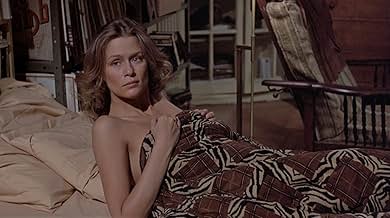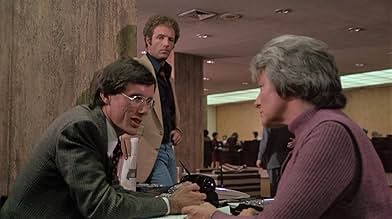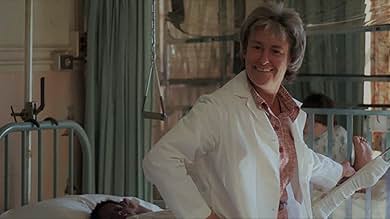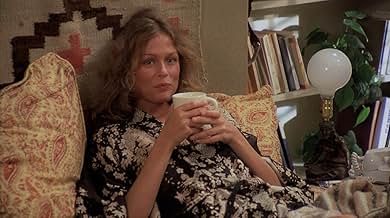ÉVALUATION IMDb
7,1/10
6,9 k
MA NOTE
Axel Freed est professeur de littérature et une passion pour le jeu. Quand il perd tout son argent et en emprunte à sa petite amie, puis à sa mère, il cumule les dettes sans pouvoir s'arrête... Tout lireAxel Freed est professeur de littérature et une passion pour le jeu. Quand il perd tout son argent et en emprunte à sa petite amie, puis à sa mère, il cumule les dettes sans pouvoir s'arrêter de jouer.Axel Freed est professeur de littérature et une passion pour le jeu. Quand il perd tout son argent et en emprunte à sa petite amie, puis à sa mère, il cumule les dettes sans pouvoir s'arrêter de jouer.
- Prix
- 1 nomination au total
Avis en vedette
I saw this movie back in 1974/75 when it was released. I was already a Caan man. My comments are just random tidbits. Burt Young would go on to join Caan in 1975's The Killer Elite". Monkey (London Lee) was a stand-up comic who appeared numerous times on the Ed Sullivan show in the 60's. Lauren Hutton would trade Caan for Burt Reynolds in Gator. Caan earlier had beat out Burt for the role of Sonny Corleone. The line I remember most from this film is when Axel's mother is trying to get a bank loan to fund his gambling debt. There are some bureaucratic snafus and the bank officer isn't sure he has the proof to approve the loan to mom. Caan says "I came out of her womb and I know she's my mom. Now give her the god... money!".
Sometimes he wins; but mostly he loses. Gambling is an addiction for Axel Freed (James Caan), a professor of English literature and lover of classical music. The film is set in New York City.
The object of the obsession can be almost anything on which a bet is placed: dice, cards, a basketball game, a college football match. It really doesn't matter. Axel just can't keep from making bets. He's like two different people. In a classroom setting, he is logical and intelligent. But when betting, he throws away the logic in favor of risk taking. In these situations he seems to lack the normal psychological "brakes" that could be applied to his destructive over-betting. In his own words: "I like the threat of losing". And always in the background are the thugs and the con men that lord over Axel, when he borrows to gamble, but can't pay his debt.
Some of Axel's classroom lectures have real thematic value. The ideas relate both to him, and incidentally to some modern-day politicians. For example, a person "... claims an idea is true because he wants it to be true, because he says it's true. And the issue isn't whether he's right, but whether he has the will to believe he's right, no matter how many proofs there are that say he's wrong". Axel continues: "D.H. Lawrence says Americans fear new experience more than they fear anything. They are the world's greatest dodgers, because they dodge their own very selves". Heavy stuff.
Despite a disappointing ending, "The Gambler" is an interesting character study of a personality type that is all too prevalent in modern society. The film's color cinematography is generally dark, in keeping with the film's theme. Overall acting is fine. Paul Sorvino gives an especially convincing performance, as does James Caan. The plot proceeds rather slowly.
Mostly, the film has terrific thematic value. It encourages the viewer to pause and reflect, to ponder, to question one's own motivations. That is a trait lacking in many current movies.
The object of the obsession can be almost anything on which a bet is placed: dice, cards, a basketball game, a college football match. It really doesn't matter. Axel just can't keep from making bets. He's like two different people. In a classroom setting, he is logical and intelligent. But when betting, he throws away the logic in favor of risk taking. In these situations he seems to lack the normal psychological "brakes" that could be applied to his destructive over-betting. In his own words: "I like the threat of losing". And always in the background are the thugs and the con men that lord over Axel, when he borrows to gamble, but can't pay his debt.
Some of Axel's classroom lectures have real thematic value. The ideas relate both to him, and incidentally to some modern-day politicians. For example, a person "... claims an idea is true because he wants it to be true, because he says it's true. And the issue isn't whether he's right, but whether he has the will to believe he's right, no matter how many proofs there are that say he's wrong". Axel continues: "D.H. Lawrence says Americans fear new experience more than they fear anything. They are the world's greatest dodgers, because they dodge their own very selves". Heavy stuff.
Despite a disappointing ending, "The Gambler" is an interesting character study of a personality type that is all too prevalent in modern society. The film's color cinematography is generally dark, in keeping with the film's theme. Overall acting is fine. Paul Sorvino gives an especially convincing performance, as does James Caan. The plot proceeds rather slowly.
Mostly, the film has terrific thematic value. It encourages the viewer to pause and reflect, to ponder, to question one's own motivations. That is a trait lacking in many current movies.
7sol-
A gritty, realistic film about addiction, it has a bit of haunting atmosphere to it, and although awfully dreary and a touch too harrowing for its own good, the film still packs a punch. Caan has a very interesting character, one who understands his own addiction yet still deceives himself, and he gives off a very solid performance, even though his character does come off rather cold and a bit hard to relate to. What the film shows us and what happens is quite predictable, but that does not prevent it from still having potency, and the ending certainly is not predictable, and is actually rather fascinating. The film's music score fits the project perfectly, and the driving sequences depict the character's feelings very well. Certainly this worth checking out, even if it is no cinema masterpiece.
a shocker in the 70s james toback's take on Dostoevskyan's fate, caan actually seems to act instead of react and gives a far more compelling performance than say, Thief 7 yrs. later. The Gambler is James toback's career making debut and has some of the most intense scenes toback would ever film despite numerous strong films later on. the ending is monumental. watch it build and be amazed. 9 of 10.
I grew up amongst gamblers, spending much of my time hustling bowling and gin rummy throughout the Midwest, until, at 17, I shuffled off to the Ivy-covered walls of a prestigious Eastern College.
This gives me much simpatico with Axel Freed, the central character and portrait of self-destruction, the gambler, and James Toback, the film's author. Toback's own reflections suggest that Axel is in many ways auto-biographical.
As a film, The Gambler is shortsighted, an ambitious but nonetheless failed attempt by a first-time screenwriter in difficult waters. It is not without its brilliance-its relentless dedication toward conveying that any gambler's true goal is not success, but utter humiliation-destruction of one's self, and anything and anyone around him. It can be no other way.
In the 1990's where independent film has achieved an emergence and respect in its own, a film like this might have found the strength among the very talented people involved, (Toback, James Caan, Karel Reisz) to emerge into a true gem. Alas this 70's neglected studio cast-off didn't have that opportunity.
London Lee is great in support, Paul Sorvino and Burt Young are well cast as Freed's mob-ties. Young's performance as a mob leg-breaker includes quite a raw, and shocking collection scene.
Probably a pass for any but the gambling addict, for them, a head (as in tape-head) burner. For those who are intrigued by Toback's intelligent approach to the seedier side, try his next effort, Fingers (1978), a diamond in the rough.
This gives me much simpatico with Axel Freed, the central character and portrait of self-destruction, the gambler, and James Toback, the film's author. Toback's own reflections suggest that Axel is in many ways auto-biographical.
As a film, The Gambler is shortsighted, an ambitious but nonetheless failed attempt by a first-time screenwriter in difficult waters. It is not without its brilliance-its relentless dedication toward conveying that any gambler's true goal is not success, but utter humiliation-destruction of one's self, and anything and anyone around him. It can be no other way.
In the 1990's where independent film has achieved an emergence and respect in its own, a film like this might have found the strength among the very talented people involved, (Toback, James Caan, Karel Reisz) to emerge into a true gem. Alas this 70's neglected studio cast-off didn't have that opportunity.
London Lee is great in support, Paul Sorvino and Burt Young are well cast as Freed's mob-ties. Young's performance as a mob leg-breaker includes quite a raw, and shocking collection scene.
Probably a pass for any but the gambling addict, for them, a head (as in tape-head) burner. For those who are intrigued by Toback's intelligent approach to the seedier side, try his next effort, Fingers (1978), a diamond in the rough.
Le saviez-vous
- AnecdotesAccording to James Toback, before his screenplay was accepted at Paramount Pictures, and was making the rounds with actors, Peter Boyle was first interested in playing the lead. Robert De Niro lobbied hard for the role, to the point where De Niro started to dress like the writer. Toback pressured director Karel Reisz to meet with De Niro. After meeting him, Reisz said that he would not, and could not consider De Niro for the role, and if Toback kept insisting, he would not be allowed to collaborate on the film further.
- GaffesAxel knocks the pimp's hat off on the second punch. It reappears on his head on the following one.
- ConnexionsFeatured in WatchMojo: Top 10 Gambling Movies (2014)
- Bandes originalesSymphony No. 1 in D
Written by Gustav Mahler (as Mahler)
Performed by Koninklijk Concertgebouworkest (as The Concertgebouw Orchestra)
Conducted by Bernard Haitink (as Haitink)
Courtesy of Philips Records
Meilleurs choix
Connectez-vous pour évaluer et surveiller les recommandations personnalisées
- How long is The Gambler?Propulsé par Alexa
Détails
Box-office
- Brut – États-Unis et Canada
- 1 305 782 $ US
- Durée1 heure 51 minutes
- Mixage
- Rapport de forme
- 1.85 : 1
Contribuer à cette page
Suggérer une modification ou ajouter du contenu manquant

































